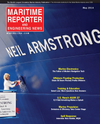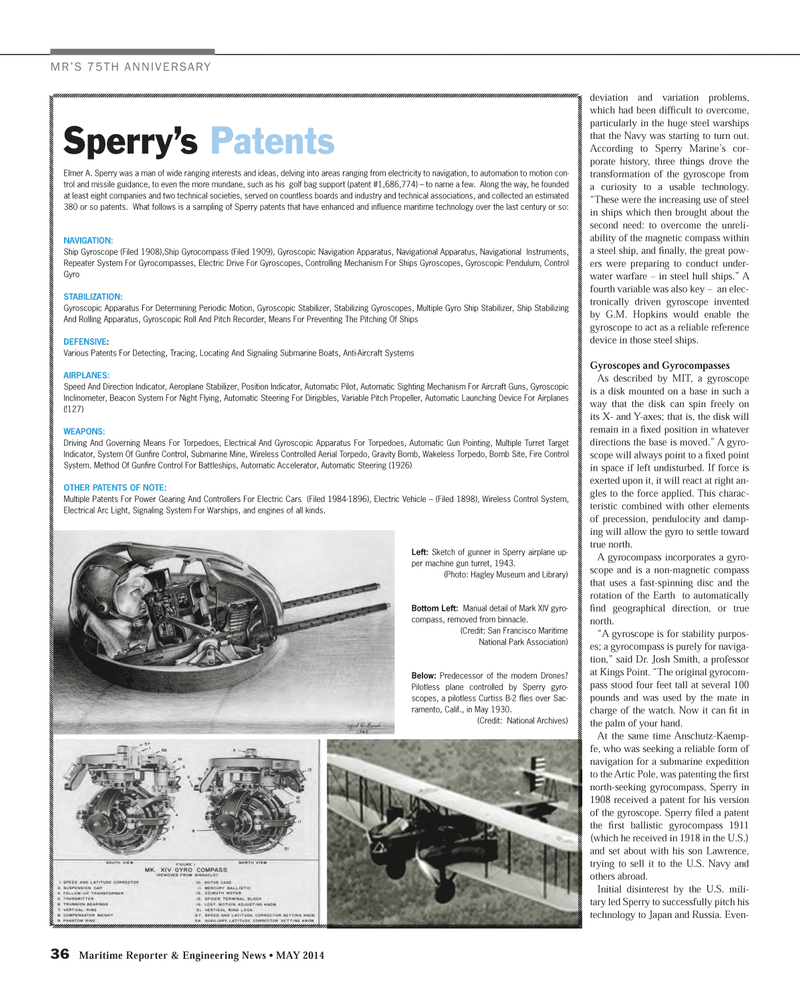
Page 36: of Maritime Reporter Magazine (May 2014)
Marine Electronics Edition
Read this page in Pdf, Flash or Html5 edition of May 2014 Maritime Reporter Magazine
36 Maritime Reporter & Engineering News • MAY 2014
Left: Sketch of gunner in Sperry airplane up- per machine gun turret, 1943. (Photo: Hagley Museum and Library)
Bottom Left: Manual detail of Mark XIV gyro- compass, removed from binnacle. (Credit: San Francisco Maritime
National Park Association)
Below: Predecessor of the modern Drones?
Pilotless plane controlled by Sperry gyro- scopes, a pilotless Curtiss B-2 fl ies over Sac- ramento, Calif., in May 1930. (Credit: National Archives)
MR’S 75TH ANNIVERSARY deviation and variation problems, which had been diffi cult to overcome, particularly in the huge steel warships that the Navy was starting to turn out.
According to Sperry Marine’s cor- porate history, three things drove the transformation of the gyroscope from a curiosity to a usable technology. “These were the increasing use of steel in ships which then brought about the second need: to overcome the unreli- ability of the magnetic compass within a steel ship, and fi nally, the great pow- ers were preparing to conduct under- water warfare – in steel hull ships.” A fourth variable was also key – an elec- tronically driven gyroscope invented by G.M. Hopkins would enable the gyroscope to act as a reliable reference device in those steel ships.
Gyroscopes and Gyrocompasses
As described by MIT, a gyroscope is a disk mounted on a base in such a way that the disk can spin freely on its X- and Y-axes; that is, the disk will remain in a fi xed position in whatever directions the base is moved.” A gyro- scope will always point to a fi xed point in space if left undisturbed. If force is exerted upon it, it will react at right an- gles to the force applied. This charac- teristic combined with other elements of precession, pendulocity and damp- ing will allow the gyro to settle toward true north.
A gyrocompass incorporates a gyro- scope and is a non-magnetic compass that uses a fast-spinning disc and the rotation of the Earth to automatically fi nd geographical direction, or true north. “A gyroscope is for stability purpos- es; a gyrocompass is purely for naviga- tion,” said Dr. Josh Smith, a professor at Kings Point. “The original gyrocom- pass stood four feet tall at several 100 pounds and was used by the mate in charge of the watch. Now it can fi t in the palm of your hand.
At the same time Anschutz-Kaemp- fe, who was seeking a reliable form of navigation for a submarine expedition to the Artic Pole, was patenting the fi rst north-seeking gyrocompass, Sperry in 1908 received a patent for his version of the gyroscope. Sperry fi led a patent the fi rst ballistic gyrocompass 1911 (which he received in 1918 in the U.S.) and set about with his son Lawrence, trying to sell it to the U.S. Navy and others abroad.
Initial disinterest by the U.S. mili- tary led Sperry to successfully pitch his technology to Japan and Russia. Even-
Sperry’s Patents
Elmer A. Sperry was a man of wide ranging interests and ideas, delving into areas ranging from electricity to navigation, to automation to motion con- trol and missile guidance, to even the more mundane, such as his golf bag support (patent #1,686,774) – to name a few. Along the way, he founded at least eight companies and two technical societies, served on countless boards and industry and technical associations, and collected an estimated 380 or so patents. What follows is a sampling of Sperry patents that have enhanced and infl uence maritime technology over the last century or so:
NAVIGATION:
Ship Gyroscope (Filed 1908),Ship Gyrocompass (Filed 1909), Gyroscopic Navigation Apparatus, Navigational Apparatus, Navigational Instruments,
Repeater System For Gyrocompasses, Electric Drive For Gyroscopes, Controlling Mechanism For Ships Gyroscopes, Gyroscopic Pendulum, Control
Gyro
STABILIZATION:
Gyroscopic Apparatus For Determining Periodic Motion, Gyroscopic Stabilizer, Stabilizing Gyroscopes, Multiple Gyro Ship Stabilizer, Ship Stabilizing
And Rolling Apparatus, Gyroscopic Roll And Pitch Recorder, Means For Preventing The Pitching Of Ships
DEFENSIVE:
Various Patents For Detecting, Tracing, Locating And Signaling Submarine Boats, Anti-Aircraft Systems
AIRPLANES:
Speed And Direction Indicator, Aeroplane Stabilizer, Position Indicator, Automatic Pilot, Automatic Sighting Mechanism For Aircraft Guns, Gyroscopic
Inclinometer, Beacon System For Night Flying, Automatic Steering For Dirigibles, Variable Pitch Propeller, Automatic Launching Device For Airplanes (!127)
WEAPONS:
Driving And Governing Means For Torpedoes, Electrical And Gyroscopic Apparatus For Torpedoes, Automatic Gun Pointing, Multiple Turret Target
Indicator, System Of Gunfi re Control, Submarine Mine, Wireless Controlled Aerial Torpedo, Gravity Bomb, Wakeless Torpedo, Bomb Site, Fire Control
System. Method Of Gunfi re Control For Battleships, Automatic Accelerator, Automatic Steering (1926)
OTHER PATENTS OF NOTE:
Multiple Patents For Power Gearing And Controllers For Electric Cars (Filed 1984-1896), Electric Vehicle – (Filed 1898), Wireless Control System,
Electrical Arc Light, Signaling System For Warships, and engines of all kinds.
MR #5 (32-41).indd 36 4/29/2014 12:17:18 PM

 35
35

 37
37
